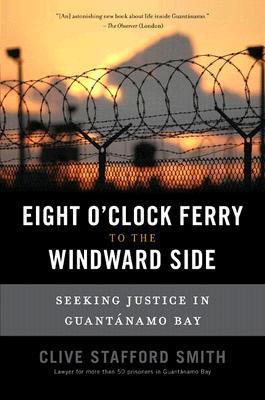

| EIGHT O'CLOCK FERRY TO THE WINDWARD SIDE Seeking Justice in Guantánamo Bay Clive Stafford Smith New York: Nation Books, 2007 |
Rating: 5.0 High |
|||
| ISBN-13 978-1-56858-374-7 | ||||
| ISBN-10 1-56858-374-5 | 307. | HC/GSI | $25.95 | |
Clive Stafford Smith, a Briton, is Legal Director and one of the founders of the charity organization Reprieve, which seeks new trials for those it deems wrongly convicted. Reprieve has helped many such in the U.S., and Smith spent over 20 years representing such clients across the American south.
When Bush began detaining 'illegal combatants', Smith became one of the lawyers assisting detainees at Gitmo — Guantánamo Bay. He worked there with Joe Margulies on some cases. But Margulies's book takes a different slant on the problem of the injustice at the extraterritorial outpost. He focuses more on the nature of the Bush administration's legal and moral transgressions. Smith is also greatly concerned with these, but pays more attention to the practical side of things: the nature of the justifications for torture, and its effect on those who administer it. He also goes into much more detail about the secret bases where some 14,000 detainees were held.1
But both vividly portray the absurdities entrained in the slipshod conduct of Bush's "war on terror." Like Margulies' client being accused of having been friends with a suicide bomber, when the alleged bomber is alive in Germany; or like insisting Smith's client Omar Deghayes appears on a tape of rebels in Chechnya when both Deghayes' brother and an expert on facial identification testify it's another man on the tape.2
"The torture Binyam described was the most dreadful I had heard, but the potential consequences of that abuse made his case even more important. When a criminal suspect is coerced into confessing it is an enormous tragedy — he has only one life and that 'confession' may mean that he spends every remaining day of it in prison. But when someone like Binyam is coerced into confessing about a radioactive bomb plot, the resulting panic filters into the lives of millions of people around the planet. It does not only result in the conviction of a potentially innocent man, but can change government policy too." – Page 79 |
Smith's conclusion is born out by the observation that Guantanamo debased every one, not just the detainees held there. The jailers would finally conclude a man was innocent, move him to better quarters, then when his lawyer left the camp, move him back into the squalid conditions and hold him there for years. They were doubling down on their hypocrisy. Guantánamo justice was a shell game.
Smith also spends more time discussing the contrast between the recent military tribunals and the Nuremberg Trials held at the close of World War II. That contrast is profound. It is the contrast between justice and vindictiveness. Supreme Court Justice Robert H. Jackson, chosen by President Truman to serve as chief prosecutor for the first round of trials at Nuremberg, described their goal thus:
"The real complaining party at your bar is Civilization. In all our countries it is still a struggling and imperfect thing," Jackson argued. "The usefulness of this effort to do justice is not to be measured by considering the law or your judgement in isolation. This trial is part of the great effort to make the peace more secure." – Justice Robert Jackson, Page 86 |
BLURB: At a July 17, 2003 press conference held jointly with Prime Minister Tony Blair, President George W. Bush described the prisoners held in Guantanamo: "The only thing I know for certain is that these are bad people." They are, supposedly, the worst of the worst of the world's terrorists. Human rights lawyer Clive Stafford Smith is one of the few people in the world who has had independent access to the prisoners at Guantanamo, representing more than fifty. Eight O'Clock Ferry to the Windward Side is his remarkable account of his descent into the darkly comic world of Guantanamo, a legal black hole in which the bleakness of the surroundings are punctuated by moments of humor and absurdity. From the absence of security at the airport, to the army protecting iguanas on the roads, Eight O'Clock Ferry to the Windward Side goes beyond the headlines to tell the true story of life at Guantanamo. By bearing witness to the prisoner's stories, Smith also asks what is done to our understanding of American democracy when the rule of law is jettisoned in the name of combatting terrorism.
"Gradually it has become clear that Guantanamo was the mother of all mistakes — an analysis of the allegations against the prisoners reflected that fifty-five percent are not even alleged to have ever taken part in hostilities." – Page 158 |
Three appendices describe a timeline of relevant events, a brief history of the Guantanamo base, and some things readers can do to help the cause of respect for human rights along. This book is vital to an understanding of how we treat detainees. Recommended.

 To contact Chris Winter, send email to this address.
To contact Chris Winter, send email to this address.